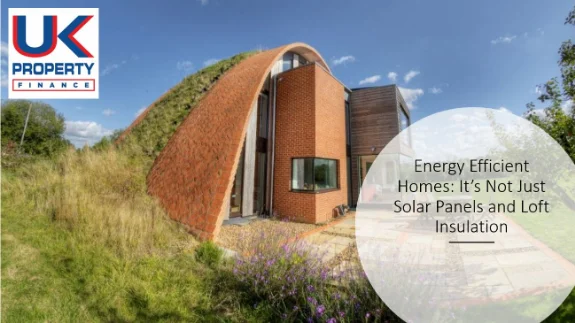Energy Efficient Homes: It’s Not Just Solar Panels and Loft Insulation

No matter how energy-efficient you think you are, a recent story published in The Mail confirmed you’re probably anything but.
For most of us, the homes we live in represent perhaps the biggest drains of all on our finite cash reserves. This is not the case for Colin Usher and his wife, who pay a total of just £15 per year in energy costs for their Wirral home.
That’s not a misprint; that’s £15 all-in. Lighting, heating, hot water, and cooking: a total annual energy bill of just £15.
Of course, it’s not as if the average homeowner has the ability or the inclination to go to such extremes. Nevertheless, the example set by the Ushers clearly demonstrates how every little helps.
And that energy efficiency isn’t only about eco-friendliness; it’s also good for your bank balance!
Simple changes, big improvements
Solar panels and loft insulation may be the most obvious ways to quickly and permanently improve energy efficiency. Nevertheless, they’re far from the only ways of cutting costs.
We have a responsibility to the environment to do what we can to reduce carbon emissions, but it’s the hard-cash savings that motivate eco-friendly initiatives in most households.
So with this in mind, here are perhaps the eight simplest yet most effective things you can do to be greener at home and reduce the pressure on your pocket:
Lower your thermostat
First up, the UK’s official energy watchdog states that by lowering your home’s thermostat to 15 degrees during the day, you’ll be looking at total annual energy savings of up to 15%.
Reuse your waste
If you have a garden, stop needlessly letting all that valuable organic matter go to waste. Composting is not only environmentally friendly but great for your garden and 100% free.
Low-flow taps and showers
Switching to low-flow taps and showers can reduce the amount of water used per minute by as much as 50%. While traditional shower heads blast around five gallons per minute, more efficient shower heads reduce this to 2.5 gallons per minute or even less.
Seal doors and windows
Weather-stripping costs next to nothing, yet it can make a remarkable difference to both the comfort and energy efficiency of your home. It’s incredibly easy to apply and makes no difference to the respective room’s aesthetic, so you may as well go ahead and use it.
Don’t rely on space heaters
They’re great when there’s an alternative, but space heaters have a tendency to be the most inefficient devices in the average home. They’re designed to emit as much energy as possible as quickly as possible, with no consideration whatsoever for energy efficiency. Hence, it’s best to minimise their use where possible.
Step up to LED bulbs
LED bulbs cost a small fortune a few years ago. Today, they’re comprehensively affordable and use up to 90% less energy than traditional light bulbs. They’re also designed to last years or even decades, which adds up to unbeatable value for money. The more light sources you have around the house, the more you’ll save by switching to LED lights.
Don’t leave chargers plugged in
If you thought leaving your various smartphone, tablet, and laptop charges plugged in was no big deal, think again. Incredibly, Energy.gov reports that unused chargers can be responsible for as much as 10% of the average home’s annual energy bill. All of which is money you’re throwing down the drain for no good reason.
Replace your electronics
Last but not least, boosting your home’s energy efficiency is also the perfect excuse for investing in the latest toys and gadgets. From computers to TVs to stereo systems to kitchen appliances, huge advances in energy efficiency are being made every year. So if there’s something you’ve not replaced for a while, it could be putting a drain on your resources. and therefore warrants replacement.
